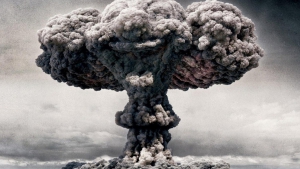Opinion | The Time to Ban Nuclear Weapons is Now by Tomas, Sweden
In 2017, the International Campaign to Abolish Nuclear Weapons (ICAN) was awarded the Nobel Peace Price ”for its work to draw attention to the catastrophic humanitarian consequences of any use of nuclear weapons and for its ground-breaking efforts to achieve a treaty-based prohibition on such weapons”. The treaty referred to by the Norwegian Nobel Committee is the Treaty on the Prohibition of Nuclear Weapons (TPNW). I believe that all states should sign and ratify this treaty since it bans nuclear weapons unconditionally. The foundation I work for, PeaceQuest International, is a partner organization with ICAN and I have been a passionate believer in and worked on this cause for years.

The nuclear weapons states including Russia and the United States are engaged in a new arms race by modernizing their nuclear arsenals and making them more powerful, thus increasing the threat to the world. In addition, the United States has left the Intermediate-Range Nuclear Forces Treaty (INF) and the Strategic Arms Reduction Treaty (START) is due to expire in 2021. This arms race is reminiscent of the Cold War, making it urgent to forbid nuclear weapons. The TPNW makes these weapons an unacceptable means of warfare by categorizing them together with other weapons of mass destruction. It sets up a stigmatization process by creating a norm that does not allow nuclear threats and it encourages disarmament measures.
Deterrence, which many proponents of the status quo claim to be the reason not to disarm, is an inherently dangerous concept. Any use of nuclear weapons would violate international humanitarian law and its rules of distinction (not targeting civilians), proportionality (attacks must be proportional to the expected military gains), precautionary measures (alerting and securing civilians), and avoiding superfluous injury. The world has already been close to being obliterated by nuclear weapons, for instance during the Cuban Missile Crisis and during the situation described in the movie ”The Man Who Saved the World”. The TPNW codifies in a common standard the legal prohibition of nuclear weapons. This approach is key to succeeding in proscribing indiscriminate and inhumane weapons as evidenced by the bans on chemical and biological weapons, anti-personnel landmines and cluster bombs.
Russia and the United States have reduced the number of warheads through bilateral negotiations. This is, however, far from enough. Nuclear weapons of today are much more effective and sophisticated than those of the past and a limited number of 100 warheads would if used have a devastating global impact.
122 states stand behind the TPNW and the nuclear-weapons states should not be allowed to hold the rest of the world hostage. The current situation is untenable. Testing of nuclear bombs has led to unspeakable suffering. And the amount of resources and money spent on producing, maintaining and supporting these weapons is staggering.
In addition, the TPNW fills a legal gap in international law and contributes to the development of international humanitarian law and disarmament law, thus nurturing a rule-based international order. And it has reenergized the nuclear divestment campaigns. The treaty becomes international law when 50 states have signed and ratified it. At the time of writing, 32 states have become parties to the treaty.
To be sure, the world has not yet seen a full-out nuclear war. Still, today´s situation is enormously risky. India and Pakistan, for example, are both nuclear-weapon states and engaged in conflict over Kashmir. North Korea´s possession of nuclear weapons is perilous and the Joint-Comprehensive Plan of Action with Iran has broken down. Some opponents of the TPNW argue that the Non-Proliferation Treaty (NPT) is sufficient. The nuclear-weapons states have, however, failed to live up to their promise to engage in negotiations on a treaty on general and complete disarmament under strict and effective international control according to Article VI of the treaty. The TPNW aims to remedy this situation and offers a way to implement this article.
Some say that the treaty´s verification regime is not strong enough. In fact, it was decided to leave the negotiations of detailed verification decisions to future meetings of the state parties and nuclear-weapons states. Finally, the parties to disarmament treaties including the TPNW may bring serious disputes or matters of international peace and security to the attention of the United Nations Security Council.
In conclusion, all states should further nuclear disarmament by signing and ratifying the TPNW. The current situation is extremely dangerous. I feel concerned because these weapons are the deadliest weapons of mass destruction and they will, if used, eradicate life on earth. Bilateral talks have failed to achieve a ban. For the first time in history, we have a treaty that forbids these terrible weapons. All states should join this agreement for the sake of all life, present and future, on this beautiful planet.
*This Op-Ed was written as part of the 2019 YaLa Alumni Opinion Writing Course





Leave a Comment
Want to join the discussion? Feel free to contribute!